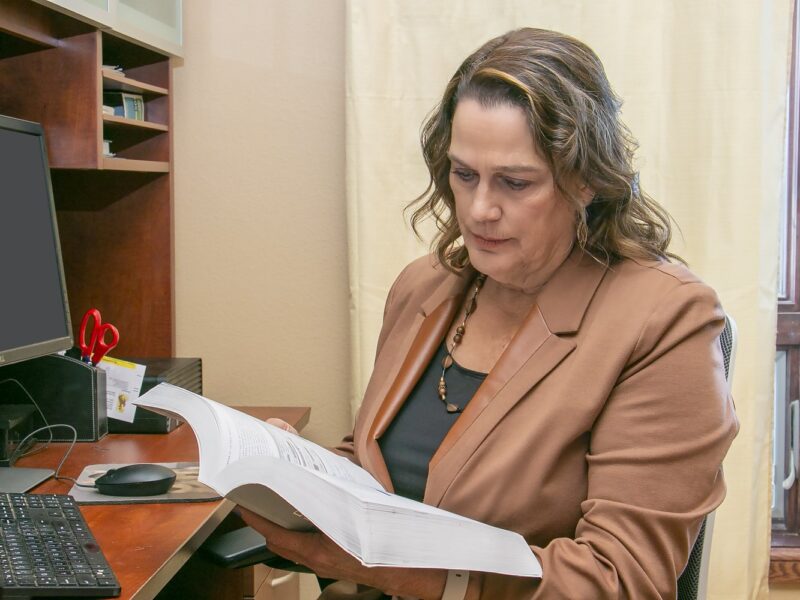UW Psychology Professor Fights to Bring Changes to Juvenile Justice in Wyoming
Retirement will have to wait for Nunez
- Published In: Other News & Features
- Last Updated: Apr 11, 2022

Narina Nunez, a professor of psychology and law at the University of Wyoming, plans to retire next year but vows to continue to fight for juvenile justice reform. (Photo by Christine Kronz for the Wyoming Truth)
By Walter Ko
Special to the Wyoming Truth
Dr. Narina Nunez, a longtime advocate for juvenile justice and children’s rights in Wyoming, is looking to hang up her boots next year.
By then, she and her husband plan to move into a retirement home they bought in Lake Havasu, Arizona, and finally escape the cold winter of Wyoming. But until then, Nunez has much work left to do, especially helping to improve juvenile justice for the state, a topic that has only recently gained the spotlight from legislators and the state government.
“I certainly have a passion for juvenile justice, and I have always wanted to see Wyoming make some progress towards fixing its juvenile justice system,” Nunez said in an interview with the Wyoming Truth. “So, as I spent more time on it, people came to ask me for help, and that’s probably why I got asked to be in groups that are looking to make efforts on juvenile justice. When people ask me for help, I help, so here I am.”
Nunez, a professor of psychology and law at the University of Wyoming, is a member of the State Advisory Council on Juvenile Justice, having served as a member of the panel for nearly 13 years. She views her involvement with the council as one of the most important parts of her life as a juvenile justice advocate and academic expert.
“There are a couple of us on the council that are faculty members and, not surprisingly, we get tasked with things like the grants committee and the data committee,” Nunez said, adding, “I love data, so I’m more than happy to run reports, analyses and things like that, and everyone on the council works on juvenile justice some way or another, and they all have their own passions.”
Nunez has often helped the state advisory council apply for grants and talk with legislators on key initiatives. Her role has been especially important since the COVID-19 pandemic when state budget cuts halted many locally-run diversion programs for juveniles.
She has appeared before legislators several times since budget cuts were raised to stress the need to continue juvenile justice funding, and Nunez is one of the central figures who pushed for a bill that recently became law, seeking to reform juvenile justice by introducing a statewide data reporting system. Wyoming has struggled for years from a dearth of data on juveniles in the criminal justice system.
While the bill was under consideration, Nunez and other member of the state advisory council provided training opportunities on data collection for counties so that the initiative could kick off smoothly when bill became law.
“The plan was to do some statewide training and hold a conference to bring all the counties together, but of course, there was COVID-19,” Nunez said. “We ended up breaking the program into four different trainings that were livestreamed for anybody to join. We also worked with a couple of counties to develop what was called a report card, which is just a form with basic data that need to be reported for juvenile justice issues.”
Nicole Hauser, an executive committee member of the State Advisory Council on Juvenile Justice who stepped down as chair recently, said Nunez works to “ensure that communities are doing all they can for the kids in the vicinities.” “I know that she has offered to work with communities as they compile certain different data points, and she is helping communities how to look at that data. Her expertise is helpful for communities to understand what data tell them on what policy ideas or programs should be placed in response.”
Hauser said Nunez is also a helpful resource in pursuing increased funding for juvenile justice programs and bringing ground-level changes to Wyoming where state-run services are scarce and the system can fail to keep youths out of the court system.
“I have always been impressed with her passion and commitment to the youth in Wyoming; she is always willing to lend her expertise and take on time-consuming projects like grant writing and giving trainings,” Hauser said. “I am impressed that she is always willing to do those extra things for communities across the state even though she is a professor with a full-time job.”
Nunez, a tenured professor who teaches undergraduate and graduate students, leads the Legal Decision Making Lab at the University of Wyoming where four graduate students working toward their doctorate degrees rely on her guidance on their research projects on legal decisions and court proceedings.
“Our main research area is jury-decision making, but my students are also interested in all kinds of things,” Nunez said. “I’ve got a few students interested in things like mental illness, race, developmental disabilities, juveniles tried as adults and so forth.”
Nunez has been leading the lab since moving to Wyoming in 1987 after accepting an offer from the University of Wyoming to teach and research for its psychology department. She spent much of her earlier years traveling across the country and overseas due to her father’s military service but she did not expect to make Wyoming her home after wrapping up her PhD at Cornell University in New York.
She said she was shocked to find so much barren landscape on her arrival but grew to love it. Now Nunez is a proud mother of three, one of whom is a high school teacher in Evanston, Wyoming.
Even though retirement is looming, Nunez said she will remain involved in juvenile justice initiatives. While she expects to stay put until her last group of graduate students in the lab earn their doctorates, Nunez said she will keep in touch with activists and legislators to ensure needed reforms and changes are brought to juveniles in Wyoming.
Nunez said, “I would love to see us make some changes in the state to provide more assistance for counties to do juvenile justice right.”













